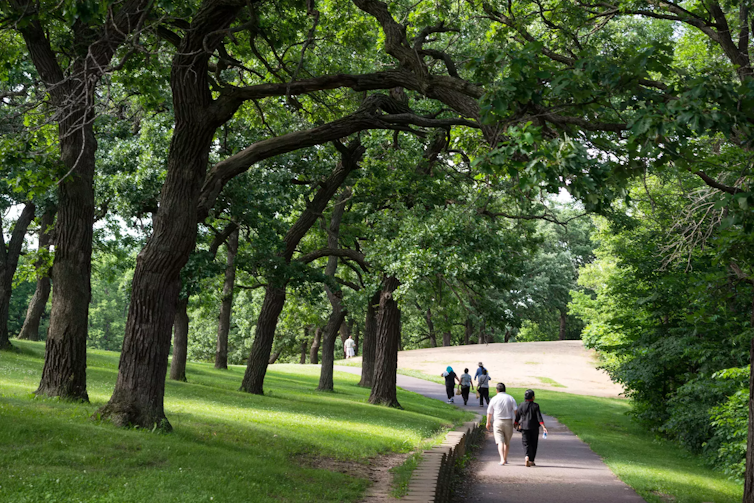Successful city parks make diverse communities feel safe and welcome

A biker and one-half on a bike and one-half make it up a path in Phalen-Keller Regional Park in St. Paul. MARLIN LEVISON/Star Tribune via Getty Images

Connecting state and local government leaders
COMMENTARY | Parks are like a city’s living room. Designing, building and managing them well makes them attractive to different groups and boosts inclusion.
This article is republished from The Conversation under a Creative Commons license. Read the original article.
What makes a city a good place to live? Practical features are important, such as well-maintained streets, good public transit and reliable trash collection. So are amenities that make cities attractive and interesting, such as museums and public parks. Access to green space is especially valuable for residents who may not be able to travel easily beyond city limits.
On May 22, 2024, the nonprofit Trust for Public Land released its annual ParkScore report which ranks U.S. cities based on the quality of their parks. Beyond tallying how many parks a city has, the rankings also consider the share of residents who live within 10 minutes’ walk of a park. This recognizes that in the U.S. and other wealthy countries, affluent white neighborhoods often have more parks than low-income areas and communities of color.
Access is important, but I believe making people feel included and welcome is equally important. If parks do this well, people will be more willing to use them.
I am an urban geographer and study how parks affect social interaction in diverse communities. My students and I are examining how people interact with the built environment of Phalen Regional Park in St. Paul, Minnesota, to understand what leads people to experience this park as a welcoming and inclusive space. I believe Phalen Park offers useful strategies that other cities can emulate.
Something for Everyone
Phalen Park is among St. Paul’s largest parks, covering 494 acres (2 square kilometers) – three times the size of Disneyland. It includes a 198-acre lake encircled by a trail, watercraft rentals, scenic views, a golf course, an amphitheater, sculptures, a playground and two pavilions for picnics, performances and other gatherings.
One important feature is St. Paul’s sole public beach with lifeguard services. Many low-income households around the park don’t have access to places where they can swim for free. Providing a safe place to swim helps reduce this inequity.

People in the Twin Cities use parks in a variety of ways. For example, Asian American park visitors are 2.5 times more likely than others to attend family events in parks, while Black park visitors are 1.75 times more likely than others to go fishing there. In surveys and interviews I have conducted, people from many social groups report that they use Phalen Park because there are so many things to do there and there are diverse groups of people in the park.
Community organizations use the park’s green spaces and shoreline for year-round public events and festivals. The park hosts cultural performances, community gatherings such as movie screenings, and regional events such as freshwater stewardship activities and dragon boat races.
These free events cater to many different age groups, attract diverse crowds and promote cultural learning and positive interracial encounters. Phalen Park is one of the most-visited parks in the Twin Cities, with an estimated 1.1 million visits in 2021.

Investing in Parks is Good for Cities
There are many practical reasons for cities to invest in public parks. Studies have found that visiting green spaces reduces stress and that people who live within half a mile of a public park tend to get more exercise than those who lack access to safe places for walking, biking and recreation. Public parks provide spaces where people can gather for free, or sometimes for a nominal permit fee.
However, it’s important for visitors to feel safe and welcome. Due to a legacy of racial segregation, and to uneven investment in parks, that doesn’t always happen.
In Chicago, for example, white and Hispanic groups have clashed over using certain segments of The 606, an elevated park that follows the path of an old rail line. These encounters have led some Hispanic visitors to avoid using parts of the park. In turn, white visitors say this distancing makes them feel suspicious of groups of Hispanic people in the park.

A Visitor Mix That Looks Like St. Paul
The Twin Cities typically perform well in ParkScore ratings – for 2024, Minneapolis ranks second among U.S. cities, followed by Saint Paul – but there’s still room to improve. The Trust for Public Land has identified significant differences in park access between people of color and white residents in Minneapolis and St. Paul. Neighborhoods in St. Paul where people of color are the predominant group have access to 24% less park space per person than the city’s average neighborhood.
St. Paul has a diverse population that measures 54.3% white, 18.3% Asian, 15.6% Black and 8.6% Hispanic, according to 2023 census estimates. Neighborhoods within a mile of Lake Phalen Park are comparably mixed, with 34.8% white residents, 34.4% Asian residents, 14% Black residents and 11.2% identifying as Hispanic.
I analyzed data from StreetLightData.com, which gathers mobile phone user data, to study visitor demographics at Phalen Park from 2019 to 2021. During that time, 54.8% of visitors were white, 23.9% were Asian, 11.8% were Black and 8.9% identified as Hispanic. These findings show that the park attracts a mix of people that mirrors St. Paul’s demographics.
What else would increase the park’s appeal as a place for diverse communities to gather? Visitors say they want more restroom facilities in the park and want them to be cleaner. Restroom availability affects how long people will stay at a park or whether they will even come. Perceptions that a park’s restrooms are dirty threaten visitors’ sense of safety and welcome.
People also want clearer guidance about park amenities, such as signs explaining public art and offering multilingual directions for using the beach, boat ramps and trails. Addressing these concerns can help reduce uncertainty and foster a sense of safety and belonging.
Expanding or improving paved trails can reduce conflicts over common spaces, such as clashes between cyclists and pedestrians. The master plan for Phalen Regional Park calls for widening the park’s trails and separating walking from biking. These changes have occurred in a few locations but not throughout the park.
Parks are like a city’s living room. Designing, building and managing them well makes people more likely to go there and stay a while. Investing resources to make parks attractive to different groups and inviting for everyone is a sure way to boost inclusion. As city leaders digest this year’s ParkScore ratings, Phalen Park offers a model for other diverse urban communities.
![]()
Dan Trudeau, is a professor of geography at Macalester College.

NEXT STORY: How bullish are Americans on EVs? It depends on where the nearest charger is.




